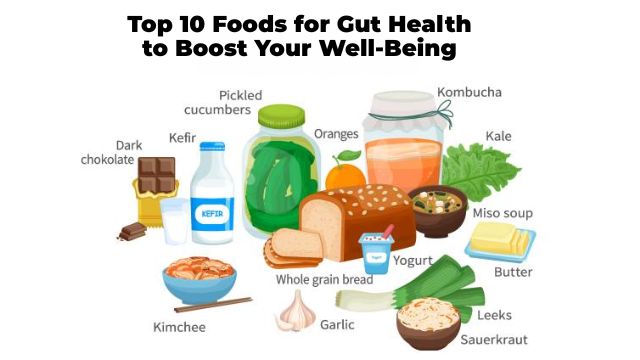The gut plays a central role in overall health, influencing everything from digestion to immunity and even mental well-being. A healthy gut microbiome, composed of trillions of beneficial bacteria, supports nutrient absorption, fights harmful pathogens, and regulates inflammation. Diet is one of the most powerful tools for nurturing gut health, and choosing the right foods can transform how you feel inside and out.
This article explores the top 10 foods for gut health, each packed with nutrients that promote a balanced microbiome and enhance well-being. From fiber-rich vegetables to fermented foods, these dietary choices are simple to incorporate and offer long-lasting benefits. By prioritizing these foods, you’ll support your digestive system and pave the way for vibrant health in 2025 and beyond.
1. Yogurt for Probiotic Power
Yogurt is a powerhouse for gut health, thanks to its rich content of live probiotics. These beneficial bacteria help balance the gut microbiome, improving digestion and strengthening immunity. Opt for plain, unsweetened yogurt with live cultures to maximize benefits, as added sugars can counteract the positive effects.
Incorporating yogurt into your diet is easy and versatile. Add it to smoothies, use it as a base for dressings, or enjoy it with fresh fruit for a nutrient-packed snack. Regularly consuming yogurt can enhance gut diversity, reduce bloating, and support a healthy digestive system. Choosing high-quality, organic options ensures you’re getting the most gut-friendly benefits.
2. Sauerkraut and Fermented Foods
Fermented foods like sauerkraut are excellent for gut health, delivering a dose of probiotics and enzymes that aid digestion. Sauerkraut, made from fermented cabbage, is rich in fiber and beneficial bacteria that promote a balanced microbiome. Its tangy flavor makes it a delicious addition to meals while supporting gut function.
Add sauerkraut to sandwiches, salads, or grain bowls for a gut-boosting twist. Other fermented foods, such as kimchi or pickles, offer similar benefits, so experiment with different varieties to keep your diet exciting. The key is to choose unpasteurized versions, as pasteurization can destroy the live cultures that make these foods so beneficial for gut health.
3. Bananas for Prebiotic Fiber
Bananas are a gut-friendly fruit packed with prebiotic fiber, which serves as food for beneficial gut bacteria. This fiber, particularly in slightly unripe bananas, supports the growth of good bacteria, improving digestion and reducing inflammation. Bananas are also rich in potassium, which aids muscle function and hydration.
Enjoy bananas as a quick snack, blend them into smoothies, or slice them over oatmeal for a gut-nourishing breakfast. Their natural sweetness makes them a versatile ingredient in both sweet and savory dishes. Including bananas in your diet regularly can help maintain a healthy gut environment and support overall digestive comfort.
4. Whole Grains for Sustained Energy
Whole grains like oats, quinoa, and brown rice are excellent sources of fiber, which is essential for gut health. Fiber adds bulk to stool, promotes regular bowel movements, and feeds beneficial gut bacteria. Unlike refined grains, whole grains retain their nutrient-rich bran and germ, making them a smarter choice for digestive wellness.
Incorporate whole grains into your meals by swapping white rice for quinoa or starting your day with a bowl of oatmeal topped with fruit. These foods provide sustained energy while supporting a healthy gut microbiome. Aim for variety to ensure you’re getting a range of nutrients that benefit both your gut and overall health.
5. Leafy Greens for Nutrient Density
Leafy greens such as spinach, kale, and Swiss chard are nutritional powerhouses that support gut health. These vegetables are rich in fiber, vitamins, and minerals that promote digestion and reduce inflammation. They also contain compounds that encourage the growth of beneficial gut bacteria, enhancing microbiome diversity.
Add leafy greens to salads, stir-fries, or smoothies for a nutrient boost. Their versatility makes it easy to include them in daily meals, whether raw or cooked. Regularly consuming leafy greens not only supports gut health but also strengthens immunity and improves overall vitality, making them a must-have in any diet.
6. Garlic for Antimicrobial Benefits
Garlic is a flavorful ingredient with potent gut health benefits. It contains prebiotic compounds that feed beneficial bacteria and has antimicrobial properties that help balance gut flora by reducing harmful pathogens. Garlic also supports immunity and reduces inflammation, making it a valuable addition to a gut-focused diet.
Incorporate garlic into your cooking by adding it to soups, stir-fries, or roasted vegetables. Its robust flavor enhances a wide range of dishes while delivering health benefits. Using fresh garlic cloves rather than processed versions ensures you’re getting the maximum gut-supporting compounds for optimal results.
7. Ginger for Digestive Comfort
Ginger has long been celebrated for its ability to soothe the digestive system and promote gut health. This root contains compounds that stimulate digestion, reduce bloating, and alleviate nausea. Ginger also has anti-inflammatory properties that support a healthy gut environment and overall well-being.
Add fresh ginger to teas, smoothies, or stir-fries for a zesty kick that benefits your gut. Grating ginger into warm water with lemon is a simple way to create a gut-soothing drink. Regular consumption of ginger can help maintain digestive comfort and enhance the efficiency of your gut’s functions.
8. Berries for Antioxidant Support
Berries, such as blueberries, strawberries, and raspberries, are packed with antioxidants and fiber, both of which support gut health. The fiber in berries promotes regular digestion, while antioxidants reduce inflammation and protect the gut lining. These vibrant fruits also provide vitamins that enhance overall health.
Enjoy berries as a snack, blend them into smoothies, or sprinkle them over yogurt for a gut-friendly meal. Their natural sweetness makes them a delicious way to boost your intake of gut-supporting nutrients. Including a variety of berries in your diet ensures you’re getting a range of antioxidants for maximum benefits.
9. Legumes for Plant-Based Fiber
Legumes, including lentils, chickpeas, and black beans, are rich in fiber and plant-based protein, making them excellent for gut health. The fiber in legumes supports regular bowel movements and feeds beneficial gut bacteria, while their nutrients promote overall digestive function. Legumes are also affordable and versatile, fitting into many dishes.
Add legumes to soups, salads, or grain bowls for a hearty, gut-nourishing meal. Hummus, made from chickpeas, is another delicious way to incorporate legumes into your diet. Regularly consuming legumes can improve gut diversity and support long-term digestive health, making them a staple for wellness.
10. Nuts and Seeds for Healthy Fats
Nuts and seeds, such as almonds, chia seeds, and flaxseeds, are packed with healthy fats, fiber, and nutrients that benefit gut health. The fiber in these foods supports digestion, while healthy fats reduce inflammation and promote a balanced microbiome. Nuts and seeds also provide a satisfying crunch that adds texture to meals.
Sprinkle chia seeds or flaxseeds over smoothies, yogurt, or salads, or enjoy a handful of almonds as a snack. These small but mighty foods are easy to incorporate and deliver significant gut health benefits. Choosing unsalted, raw varieties ensures you’re getting the most nutritional value without added sodium.
Conclusion: Nourish Your Gut for a Healthier You
A healthy gut is the cornerstone of overall well-being, and the foods you eat play a critical role in supporting it. By incorporating these top 10 foods for gut health into your diet, you’ll nourish your microbiome, improve digestion, and boost your energy and immunity. From probiotic-rich yogurt to fiber-packed legumes, each food offers unique benefits that contribute to a vibrant, healthy life.
Start by adding a few of these foods to your meals each week, experimenting with new recipes and flavors to keep things exciting. Small, consistent changes can lead to significant improvements in how you feel, both physically and mentally. With these gut-friendly foods as part of your routine, you’ll be well on your way to thriving in 2025 and beyond.





